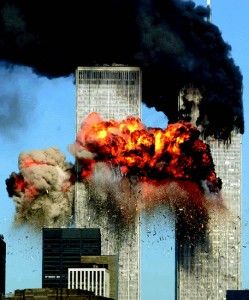 A lengthy if not especially scientific survey of my Facebook friends today found that most of them who posted about 9/11 focused on their location during the tragedy. They told their perspective on the situation always through the lens of space: I was at the doctor’s office when … I was in class when … I was driving with my nephew when … Somehow, location — their own location — matters much more than what they were doing or why. Somehow their own location takes precedence in their posts, over and above the location of the events themselves.
A lengthy if not especially scientific survey of my Facebook friends today found that most of them who posted about 9/11 focused on their location during the tragedy. They told their perspective on the situation always through the lens of space: I was at the doctor’s office when … I was in class when … I was driving with my nephew when … Somehow, location — their own location — matters much more than what they were doing or why. Somehow their own location takes precedence in their posts, over and above the location of the events themselves.
Why focus on space? Why would everyone take an event so deeply rooted in a particular location and decentralize it across the U.S.? Why wouldn’t people, as they commemorate the 11th anniversary of 9/11, choose to focus on the event itself rather than focus on their situation during the event? Isn’t that somewhat narcissistic?
Maybe I find everyone talking about their experience in the Midwest or in California odd because I was actually present in New York. I saw the towers fall with unshielded eyes. From the 21st story of an apartment building in the East Village. With a better view than the news helicopters. So maybe it’s a proprietary feeling. As a naked-eyeball witness, I know the most important location(s) where it happened, and it seems odd to diffuse that importance across the nation.
But I think this diffusion is the attempt to make 9/11 personal, for people to insist that they own this tragedy, and that they were wounded, deeply wounded. It’s this focus on their space rather than on the epicenters that insists that this country belongs to them — a kind of nationalism. They are right to say that a tragedy that happened in D.C. and in New York wasn’t limited to those locations, and they are right to enshrine their own locations with a kind of sacred reverence, because all those places are forever linked to 9/11, even if only by the tenuous threads of memory.
That’s why I feel that the great novel which will be written about 9/11 — which hasn’t been written yet, despite the best efforts of Joseph O’Neill and Claire Messud and Jonathan Safran Foer — might not even take place in New York. That seems odd, I know, because the great fiction about wars like the Vietnam war (O’Brien, The Things They Carried, for example) does take place in the country of occurrence, and I have a hard time imagining a great war novel could take place anywhere but in Vietnam.
Somehow, 9/11 is different. It’s not only spread across the nation but across the world. 9/11 really happened in a kitchen in Malibu and in corn fields in Ohio and on a ranch in Texas. It happened in the boardrooms of Los Angeles and between the sheets in Florida and in car on the Mississippi interstate. It happened wherever there were people to witness it. One of the most location-centric tragedies of the last century is not really location-centric at all.
Two of my favorite stories about 9/11 are by Chris Adrian, and neither of them take place in New York. “The Vision of Peter Damien” takes place in the late 1800s, in an undisclosed but seemingly agrarian location, where children receive visions of crashing planes and fiery visions. And in “The Changeling,” which seems to take place in suburbia, a nuclear family watches 9/11 on television, and the souls of those who died in the tragedy inhabit the little boy. It’s the strangest story of possession you’ll ever read and somehow perfectly captures the mix of emotions swirling around the event.
Adrian’s stories are powerful not despite their lack of proximity to the tragedy but because of it. They match the emotions of so many people affected by these tragedies, people whose distance from the events did not soften the emotional impact. Distance doesn’t matter because 9/11 happened in the space where you heard of it.
Here. And there. And here. And there.

2 comments
that is very,very sad
It was sad indeed. I was about 300 miles from NYC when it happened. Watched everything minutes after it happened. Seeing that image everything what happened recalls again.